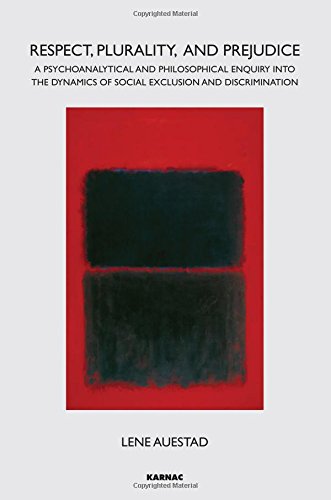Respect, Plurality, and Prejudice: A Psychoanalytical and Philosophical Enquiry into the Dynamics of Social Exclusion and Discrimination

Book Details
- Publisher : Routledge
- Published : 2015
- Cover : Paperback
- Pages : 384
- Category :
Psychoanalysis - Category 2 :
Psychotherapy and Politics - Catalogue No : 35283
- ISBN 13 : 9781782201397
- ISBN 10 : 1782201394
Reviews and Endorsements
‘The sophisticated mix of examining prejudice refracted through the lenses of philosophy, social theory and psychoanalysis makes this book so important for our times. Whilst tackling a dark subject, it provides hope in thinking about the experiences of mutuality and respect between the Self and the Other.’
— Dr Jonathan Sklar, Training Analyst, British Psychoanalytical Society
‘Lene Auestad’s book offers a penetrating analysis of the mechanisms – often unconscious – at work in various cases of prejudice in contemporary society. Ranging from the individual as well as collective dynamics of racism to the debate over freedom of speech, the book demonstrates the usefulness of drawing on psychoanalytic insights in order to understand the deeper layers of the aggression against stigmatised “others” in today’s Europe.’
— Professor Arne Johan Vetlesen, Department of Philosophy, University of Oslo and author of Evil and Human Agency
‘With great intellectual rigour and audacity, Lene Auestad offers a politically engaged analysis of the complexities of the experience of prejudice. Navigating through phenomenological, psychoanalytical, and sociological accounts, Respect, Plurality, and Prejudice connects the subjective with the political and the social with the unconscious. Critiquing contemporary forms of racism and violence and facing the ethical challenges that derive from the theorising of “being among others”, this book is a wonderful and necessary addition to the emerging field of Psychosocial Studies.’
— Dr Margarita Palacios, Senior Lecturer, Psychososcial Studies, Birkbeck, University of London
‘Lene Auestad’s work is an eminently important scholarly contribution to the understanding of prejudice, hate speech, discrimination, and social exclusion – phenomena that challenge and threaten democracies in Europe, “old” and “new”. Investigating prejudice and related problems, she combines philosophical, sociological, and social psychological enquiry with psychoanalytic reflections. She applies the ideas of Sigmund Freud, Sándor Ferenczi, Michael Balint, and of the object relational school to examining prejudice and other social phenomena in a highly original and productive way. She integrates these approaches in the framework of psycho-social studies. This excellent book should be read by all social scientists, psychoanalysts, and psychologists who are obliged to fight against prejudice and racism – in practice as well as in theory.’
— Professor Ferenc Eros, Department of Social Psychology, University of Pecs

